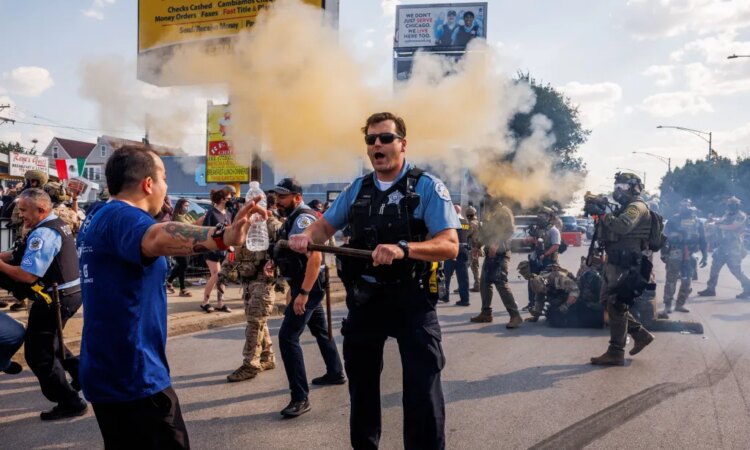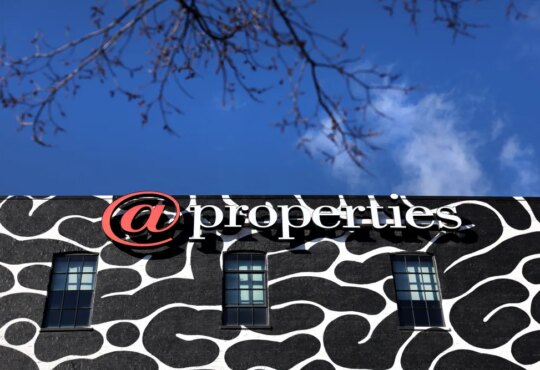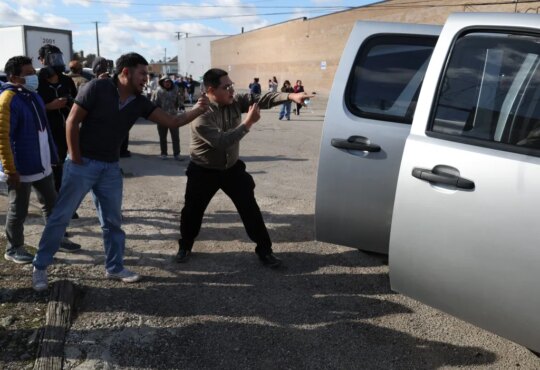
Federal agents had just sped away from a working-class residential block in Chicago’s East Side neighborhood when a white-shirted Chicago police officer took a deep breath, ducked under a running garden hose and stayed there for several moments. Tear gas still hung in the air and residents were still collecting themselves.
The officer scrubbed at his damp face. He was one of several supervisors who had stood to the side as a crowd of angry neighbors gathered around Border Patrol agents who crashed a car at the intersection of 105th Street and Avenue N.
When people started to throw things, agents filled the block with riot control gas and drove off, leaving disoriented neighbors and police behind.
Chicago police have found themselves in a curious position as the Trump administration’s Operation Midway Blitz has rolled out across Chicago. City and state laws generally bar the Chicago Police Department from assisting federal immigration enforcement operations, but local police are still obligated to maintain order and public safety on the streets.
On at least two occasions — in Brighton Park and East Side — CPD personnel responding to standoffs between neighbors and federal agents have found themselves tear-gassed alongside residents as agents react to thrown objects and shouted insults.

As of Friday, agents had deployed tear gas in a total of six neighborhoods, most recently in Little Village and Lakeview . A total of 40 officers have been exposed to the gas.
Elsewhere in the Chicago area, police and fire personnel have also faced federal agents’ aggressive crowd-control tactics, in another headache for local authorities. An early point of contention for Broadview Mayor Katrina Thompson was the repeated exposure to tear gas and pepper balls for the police and fire department members tasked with responding to conflicts outside the U.S. Immigration and Customs Enforcement processing center located in the western suburb.
Chicago Police Department members who spoke to the Tribune, asking their names be withheld, said skirmishes like the ones in East Side or Brighton Park were “a mess” and would remain so until the department issued better guidance on how to handle them.
The Tribune interviewed police officers across several ranks stationed throughout the city who have had different levels of interaction with federal agents, granting anonymity to them so they could speak candidly about their role in Trump’s “blitz.”
Many officers blamed residents who threw things at agents as much as they did ICE or Border Patrol personnel themselves for the frightening, chaotic endings to those confrontations. In a statement to the Tribune, U.S. Department of Homeland Security Assistant Secretary for Public Affairs Tricia McLaughlin accused local leaders of preventing police from “properly protecting their (city)” and claimed that police were refusing to assist federal agents who called for help.
Chicago police, for their part, held a range of views on how they should or should not be involved in federal immigration enforcement. But several observed that in recent weeks, federal officers often seemed to be letting their emotions get the better of them.
“Chill the hell out,” one officer said of federal agents. “Someone throwing something at you might hurt you, but it’s not gonna kill you.”
Conversely, the officer acknowledged, “Tear gas isn’t going to kill us either,” but said the use of chemical crowd control without any warning and lack of communication between federal agents and officers made already tense situations worse and hampered or incapacitated police who are trying to execute basic public safety responsibilities.
“We appreciate what they’re doing,” the officer said. “But there’s a better way to go about this.”
“I am not on anybody’s side”
Chicago’s self-declared “sanctuary city” status and the Illinois TRUST Act both generally prohibit state and local law enforcement agencies from assisting federal agents with immigration enforcement. But as residents gather and tensions rise on the heels of shootings, car crashes and other highly visible enforcement efforts, cops are still tasked with keeping order.
“It’s kind of confusing,” one officer said. “But as complicated as it is in some ways, it’s very simple in others. We’re just talking about the basics — the minimum of what we need to do to protect everybody involved.”

Many said they saw CPD’s job as being a “wedge” between two adversarial groups, similar to many other disturbances the department might respond to. A few noted that they routinely deal with confrontations where emotions are running high and which they may or may not disagree with personally.
“If ICE is going to take enforcement action, that’s completely separate from what we do,” another officer said. “I am not on anybody’s side. But my actions are very often seen as political actions.”
Several referred to police as “pawns” in a political chess game captained by the president on one side and state and local leaders on the other.
“We’re just stuck in the middle of it,” another said. “I don’t think you could ever find a happy place for CPD in this.”
Some expressed sympathy for federal agents who have released gas, shot pepper balls or otherwise physically confronted civilians. One officer said residents need to understand that “ICE is a law enforcement agency, and when you have people throwing things at the police … you have to expect things are not going to go in your favor if you do.”
“The leading reason for police use of force is lack of compliance,” that department member said. “I’m a law enforcement officer. I’ve had people defy things I’ve needed done and had to get physical.”
Another officer said the main role for a local police force is to “protect life and property and keep the peace,” so that would include protecting federal immigration enforcement agents if they’re in a bind on the streets.

But where it gets muddled, he said, is during protests, when citizens protesting against ICE and Border Patrol personnel see Chicago police officers protecting the federal officers. He said a normal citizen might think, albeit erroneously in his view, that Chicago police’s efforts in that situation are helping the federal officers with immigration enforcement when they aren’t.
The officer also noted that the federal officers’ decisions to use force are different from those typically made by Chicago police officers during volatile situations.
“Tactically, they’ve been very quick to use tear gas and pepper spray,” the officer said of the federal agents.
However, in 2020 in the wake of George Floyd’s murder, CPD was caught flat-footed during widespread looting and unrest in the downtown area. In the years since, especially in the lead-up to the August 2024 Democratic National Convention, CPD officers underwent days of additional crowd control training.
Large crowds are a common challenge for the city’s police, and CPD officers have overseen countless protest marches in and around downtown over the last decade. For permitted marches, organizers share route plans with the police and officers are able to block vehicle traffic as needed.
Several said the current tensions in the city paled in comparison to the unrest of 2020, but said federal agents were making their jobs, along with CPD’s job, harder by not communicating about their movements or their plans to deploy chemical crowd controls.
One officer remembered that police districts used to get a heads-up about federal law enforcement activity taking place nearby: “If DHS was going to be in the district, they would call with a heads-up, like ‘Hey, we’re going to be working in the district in the area of 26th and Kedzie between 8 and 10,’” he said. “They don’t seem to do that anymore.”
Another said that while CPD wasn’t able to assist with enforcement, it might be able to help prevent escalations at tense scenes. But the way things are now, “the crowd is already on (federal agents) by the time we get there.”
“It’s not cooperation,” that officer said. “It’s communication. It’s not marriage. It’s not a long-term thing. But we’re dating. As a courtesy, you should say, ‘I’m going to go to 105th and Avenue N with my friends.’ And I’d be like, ‘Cool. I’m gonna go to 105th and Avenue N with my friends too.’”

Following the Brighton Park clash, Superintendent Larry Snelling on Oct. 6 declared that “my officers are not political pawns” and told reporters that he had “had a conversation” with federal authorities “about how we were going to work this out” and improve communication.
The standoff on the East Side took place the following week. Another 13 officers were exposed to tear gas.
A range of opinions
Police who discussed federal action in the city had a range of views on the politics of Operation Midway Blitz and said that while police officers tend to lean Republican, CPD’s 11,000-plus department members hold a vast spectrum of opinions.
One Chicago police homicide detective said his workload is so intense that any assistance from the federal government would help, including from immigration enforcement. He said in the last year, he can think of a couple of homicide cases he’s handling in which the suspects or victims are undocumented immigrants.
“And if those people weren’t here, would that have happened? Probably not,” the detective said. “The president said he was going to do this stuff and he’s doing it. And they’re (his critics) just pissed that he’s doing it.”
A big reason the detective welcomed help from the federal government is because of the level of violence in the city. While homicides in Chicago have gone down sharply in the last several years — a statistic many Trump opponents like to point out — the city still leads the country in homicides in sheer numbers every year.
“Real life, you can’t follow pie charts. You can’t follow graphs,” the detective said. “They’re not on the street dealing with the murders, dealing with the families and the aftershock that I have to deal with. I have to get the phone calls of the families of the dead people. … I have one mother who calls me every week because I don’t have the time or ability to work the case.”

Another officer liked the idea that federal agents were rounding up “the really rotten ones” but saw merit in “arguments all the way around the table” for different ways to handle unauthorized immigration.
Others thought that “it seems like there’s a better way they could go about it” and questioned the purpose of apprehending “someone that’s been here 30 years, just kind of minding their own business.”
“Are we going to go after the lady who has a tamale cart on 26th Street?” one officer said. “Should we be rounding them up and stopping them?”
And yet another officer — who said he witnessed the feds arrest an elderly man while he was off duty — said he saw potential Fourth Amendment violations in some of the arrests conducted.
“You could call it illegal,” he said.
Many Chicago cops are Latino, another officer said. Their parents are from Mexico. And those officers have strong feelings “about people getting picked up off the street” and being profiled. The officer said the federal government should spend more time going after criminals rather than someone who has a clean record other than entering the U.S. illegally.

But others are hard-line supporters of the arrests and deportations, even for people without a criminal record or who were neighborhood stalwarts making positive contributions.
“Get ’em all — should we not write tickets on cars that don’t have city stickers? We can’t pick and choose,” another officer said.
At the same time, the officer continued, some department members had parents who themselves were in the country without authorization and are “very against ICE.” And on the other end of the spectrum, “even worse than I am,” were some police officers whose parents came to the country legally and had to wait years to bring a spouse or other family over.
“The only thing we can all agree on is, if you shoot a cop, you’re going to jail, minimum,” the officer said. “But then we all want to know if it was a dirty cop.”
Interrupting the normal
A retirement party was underway in the South Chicago (4th) District the day that federal agents and residents confronted each other at 105th Street and Avenue N. Some of the people there were watching news coverage of the standoff on their phones and knew that agents had deployed tear gas, but not that CPD officers had gotten caught up in it.
Then cops began to come back to the station from the scene, at 103rd and Luella Avenue. One group had been downwind. Another had not. One officer who was present for their return described the second group as “a hot mess.”
It was at least the second time police had been present and unprepared for the use of chemical crowd controls. A memo went out from now-former First Deputy Superintendent Yolanda Talley directing all officers to have their helmets and gas masks easily accessible at all times until further notice later that afternoon.
Some officers told the Tribune they or people they worked with hadn’t been issued gas masks, and that the department seemed to be playing catch-up on issuing protective equipment. CPD representatives denied that the department was seeing a gas mask shortage and said officers were given their masks after being trained for their specific assignment. Varying assignments mean that not everyone gets assigned a mask.

Officers were frustrated with federal agents for not issuing warnings before they deployed gas, flash-bangs or pepper balls. But many also blamed people who have made it their mission to throw sticks in federal gears by tailing ICE, blowing whistles or throwing things at agents.
“We cannot erase the law because the results make us feel a certain way,” one officer said. “People are adding their emotions and that’s what’s creating the resistance.”
That officer was sympathetic to the wrenching stories that have surfaced about the families who are being separated as a result of the deportations, nodding to one he’d seen about a man who had resided in the U.S. for 30 years before his arrest.
“It truly is a sad story,” the officer said. “But if you look at the law, he was in violation 30 years ago. You have to move to get the laws changed.”
But that same officer and others noted that the emotions were running high on all sides. Another department member said ICE and other federal agents should be tougher and learn to withstand provocation without creating more chaos.
“ICE isn’t like CPD,” the officer said. “Either handle your (expletive) or don’t gas us.”
Tribune’s Sam Charles contributed.





